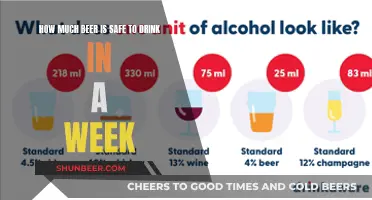
People with diabetes can drink beer, but only in moderation. Alcohol can affect blood sugar levels, so it's important to be mindful of how much you drink and to monitor your blood sugar levels. The general recommendation for alcohol consumption is no more than one drink per day for women and up to two drinks per day for men. When it comes to beer, one drink is typically considered to be 12 ounces or one can or bottle. However, it's important to check the size of the drink, as some cans and bottles may be larger than 12 ounces. It's also recommended to drink beer with food to prevent hypoglycemia and to stay hydrated by drinking plenty of water.
| Characteristics | Values |
|---|---|
| Alcohol consumption recommendations for diabetics | No more than one drink a day for women and up to two drinks a day for men. |
| Definition of one drink | 12 fluid ounces of regular beer (5% alcohol) |
| Binge drinking | More than four drinks (for women) or five drinks (for men) within two hours |
| Alcohol's effect on the liver | Alcohol competes with the liver's ability to make glucose |
| Alcohol's effect on blood sugar | Alcohol can cause hypoglycemia (low blood sugar) |
| Alcohol's effect on medication | Alcohol may reduce the effectiveness of diabetes medications |
| Alcohol's effect on weight | Alcohol stimulates appetite and may cause weight gain |
| Alcohol's effect on blood pressure | Drinking too much alcohol can increase blood pressure |
| Alcohol's effect on triglyceride levels | Drinking too much alcohol can increase triglyceride levels (fat in the blood) |
What You'll Learn

How much beer is safe for diabetics to drink?
If you have diabetes, drinking alcohol may be safe for you if you follow certain guidelines and consider its effects on your blood sugar levels. Beer is a significant source of carbohydrates, so it can impact blood sugar. It is also high in calories, which may contribute to weight gain over time.
According to the 2020-2025 Dietary Guidelines for Americans, moderate alcohol intake is defined as up to one drink per day for women and up to two drinks per day for men. One standard drink is equivalent to 12 fluid ounces of regular beer (5% alcohol). However, it is important to note that drink sizes may vary, and some beer cans or bottles might be more than 12 ounces. Therefore, it is recommended to check the volume before consuming.
For people with diabetes, it is generally recommended to drink in moderation, choose low-carb and low-sugar beverages, avoid drinking on an empty stomach, and monitor blood sugar levels closely before, during, and after drinking.
To avoid hypoglycemia, it is important to drink with food and check your blood sugar often while drinking and up to 24 hours after you stop drinking. Additionally, drinking plenty of water and pacing yourself by having no more than one drink per hour is advised.
If you are taking medication for diabetes or any other health condition, it is crucial to discuss the effects of mixing alcohol and medication with your healthcare provider. They can provide personalized advice and guidelines based on your specific health needs.
Drinking Non-Alcoholic Beer in Public: Is It Okay?
You may want to see also

What are the risks of drinking beer with diabetes?
Drinking beer, or any alcoholic beverage, comes with certain risks for diabetics. Firstly, alcohol can interfere with blood sugar levels, as the liver prioritises clearing alcohol from the body over maintaining blood glucose. This can lead to hypoglycaemia or low blood sugar, which is dangerous and can cause dizziness, drowsiness, confusion, difficulty walking, seizures or even loss of consciousness. The risk of hypoglycaemia is higher if drinking on an empty stomach, and it can last up to 24 hours after drinking.
Secondly, drinking can affect weight management. Alcoholic drinks are often high in calories, and regular drinking can contribute to weight gain over time. This is a concern for diabetics as being overweight or obese increases the risk of developing type 2 diabetes.
Thirdly, drinking can increase the risk of other health complications associated with diabetes, such as heart disease, nerve damage, and high blood pressure. Alcohol can also negatively impact sleep and dehydration, and in the long term, it may lead to certain cancers.
It is important to note that moderate drinking (no more than one drink per day for women and up to two drinks per day for men) may have some benefits for diabetics, such as improved blood glucose management and insulin sensitivity. However, excessive drinking (more than three drinks daily) can lead to higher blood glucose levels. Therefore, it is crucial for diabetics to drink in moderation, eat while drinking, and monitor their blood sugar levels regularly to avoid complications.
BeerSmith Compatibility: Apple Devices and Beyond
You may want to see also

What are the benefits of drinking beer with diabetes?
While drinking beer or any alcoholic beverage is not recommended for diabetics, some studies have shown that drinking in moderation may have some benefits for people with diabetes. It is important to note that these benefits are not limited to beer specifically and can be obtained from other alcoholic drinks as well. Here are some potential benefits of drinking beer with diabetes:
Improved Blood Glucose Management and Insulin Sensitivity
Moderate drinking (no more than one to two drinks per day) may help improve blood glucose management and insulin sensitivity. This effect is more pronounced in those who drink regularly, and their A1C levels may be lower compared to when they were not drinking. However, it is important to note that this does not mean non-drinkers should start drinking, as there are other factors to consider.
Increased Good Cholesterol (HDL)
Drinking alcohol in moderation has been linked to an increase in good cholesterol (HDL) in the blood. This may help lower the risk of heart disease, which is a concern for people with type 2 diabetes.
Antioxidant Properties of Red Wine
According to the American Heart Association, red wine contains antioxidants, which help prevent cell damage by counteracting free radicals. People with type 2 diabetes tend to have high levels of free radicals, so red wine may offer potential benefits in this regard. However, it is important to note that this is just a theory, and there is no definitive research linking red wine to improved diabetes management.
Social and Relaxation Benefits
Drinking beer or other alcoholic beverages in social settings can be enjoyable and help reduce stress. Alcohol can make people feel more relaxed, which may be beneficial for those dealing with the stress of managing diabetes.
It is crucial to emphasize that these benefits do not outweigh the potential risks associated with drinking for people with diabetes. Hypoglycemia (low blood sugar) is a significant concern, and drinking can interfere with the liver's ability to regulate blood sugar. Additionally, alcohol can contribute to weight gain, affect judgment, and interfere with diabetes medications. Therefore, it is essential for diabetics to consult their healthcare providers and carefully follow their recommendations regarding alcohol consumption.
Beer Drinking: Throat Cancer Risk and You
You may want to see also

What are the best types of beer for diabetics?
If you have diabetes, you may need to limit your alcohol intake or avoid it altogether. However, if you do choose to drink, there are some beer options that are better than others.
Firstly, it's important to remember that even light beers can contain carbohydrates and calories, so moderation is key. It's also a good idea to talk to your doctor or dietitian about how much alcohol is safe for you to consume.
In general, light beers tend to have fewer carbohydrates than regular beers, so they are often a better choice for people with diabetes. Some popular light beers include:
- Miller Lite: With only 3.2 grams of carbohydrates in a standard 12-ounce can or bottle, Miller Lite is a good low-carb option. It's also one of the oldest light beers on the market and is widely available.
- Coors Light: This American-style light lager is known for its crisp malt flavors and low bitterness. It has 5 grams of carbs per serving and is a popular choice for those looking for a light, refreshing beer.
- Bud Light: With fewer than 5 grams of carbs per serving, Bud Light is another good low-carb option. It has a light flavor profile and a refreshing light body, making it a versatile choice for any occasion.
- Busch Light: This beer is known for its smooth taste and lack of aftertaste. It has a fruity note with a crisp malt finish and only 3.2 grams of carbs per serving, making it a good choice for diabetics.
- Dogfish Head Slightly Mighty: This low-carb Indian Pale Ale (IPA) uses monk fruit, a zero-calorie sweetener, to balance the flavor profiles. It has subtle notes of pineapple, coconut, and citrus, with a hint of mango. With only 3.6 grams of carbs per serving, it's a great choice for craft beer lovers.
In addition to these light beers, there are also some low-calorie and low-carb beers that are diabetic-friendly:
- Budweiser Select 55: With only 2 grams of carbs per 12-ounce serving, this beer has the lowest ABV on our list at 2.4 percent.
- Beck's Premier Light: With an alcohol content of 2.3 percent, this beer is almost non-alcoholic. It has 3.9 grams of carbs and 64 calories, making it a good choice if you want to drink a couple of beers without worrying about getting drunk.
- Corona Premier: With just 2.6 grams of carbs and 4.0 percent ABV, Corona Premier is Corona's lowest-calorie option. It has a familiar aroma of fresh-cut grass and fruit and a clean, refreshing taste.
- Amstel Light Pale Lager: With 5 grams of carbohydrates in a 12-ounce bottle, this Dutch beer offers a refreshing and thirst-quenching flavor.
When choosing a beer, it's important to consider the alcohol by volume (ABV) percentage and the total carbohydrates. Beers with a higher ABV tend to have more carbs, which can cause blood sugar levels to rise. It's also recommended to stick to one serving size (12 ounces) and to never drink on an empty stomach.
Sunday Sobriety: Why You Should Avoid Beer This Weekend
You may want to see also

What should diabetics avoid when drinking beer?
When drinking beer, there are several things that people with diabetes should avoid to keep their blood sugar levels in a healthy range. Here are some guidelines to follow:
- Avoid drinking on an empty stomach: It is important to have food in your stomach when drinking beer, as alcohol can lower blood sugar levels and lead to hypoglycemia. Eating a meal or snack before or while drinking can help prevent this.
- Don't drink excessively: Stick to moderate drinking levels, which is generally defined as no more than one drink per day for women and up to two drinks per day for men. Excessive drinking can lead to higher blood glucose levels and increase the risk of hypoglycemia.
- Avoid sweet wines or drinks mixed with sugary mixers: These can cause a spike in blood sugar levels and contribute to weight gain. Opt for low-calorie mixers such as water, club soda, or diet soft drinks instead.
- Don't drink if your blood sugar is already low: Alcohol can further lower blood sugar levels, so it is important to monitor your blood sugar levels before, during, and after drinking.
- Avoid drinking if you are trying to lose weight: Alcoholic drinks are often high in calories and can disrupt your blood sugar control, making it more difficult to lose weight.
- Don't combine alcohol with exercise: This increases the chances of experiencing low blood sugar.
- Be cautious with certain diabetes medications: Alcohol can interfere with the effectiveness of oral diabetes medications and insulin. Consult your doctor or healthcare provider to understand how alcohol may affect your specific medication.
- Monitor your blood sugar levels regularly: This is important to do before, during, and after drinking, as well as up to 24 hours after drinking.
- Keep a carbohydrate source handy: Have a source of fast-acting carbohydrates, such as glucose tablets or juice, to treat low blood sugar if needed.
- Wear a medical alert: Consider wearing a medical ID bracelet or necklace to alert others of your diabetes in case of an emergency.
It is important to note that these guidelines are general recommendations, and individual needs may vary. It is always best to consult with a healthcare professional for personalized advice and to ensure that drinking beer is safe for your specific situation.
The Art of Drinking Beer and Liquor
You may want to see also







